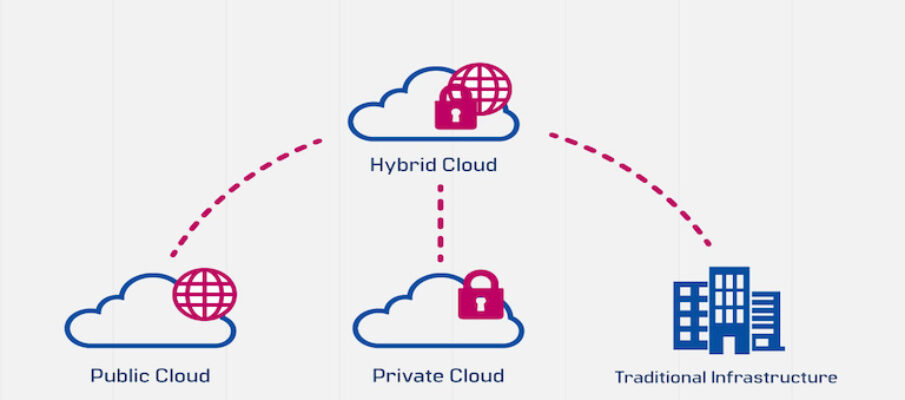Introduction
The rapid advancement of technology has opened up various avenues for businesses to store, manage, and process their data. Of these, cloud computing has emerged as a flexible, scalable, and cost-effective solution. However, migrating to the cloud is not always straightforward or feasible for every organization. Some may have significant investments in on-premises infrastructure or face regulatory restrictions that prevent them from moving all their data to the cloud. This is where hybrid cloud solutions come into play. Hybrid cloud architectures allow businesses to enjoy the benefits of both on-premises and cloud computing, bridging the gap between the two and providing a flexible and efficient solution. This article will delve into the basics of hybrid cloud solutions, the benefits they offer, and key considerations for businesses thinking of adopting this approach.
Understanding Hybrid Cloud
A hybrid cloud is a computing environment that combines a private cloud (or on-premises infrastructure) with one or more public cloud services, interconnected via orchestration between the platforms. This arrangement allows data and applications to be shared between them, offering greater flexibility and more deployment options. By doing so, businesses can move workloads between private and public clouds as costs, needs, and regulations change, giving them greater flexibility and more data deployment options.
Benefits of Hybrid Cloud
Scalability and Flexibility: One of the most significant advantages of a hybrid cloud is its scalability. Public clouds offer vast amounts of resources on-demand, allowing companies to scale up quickly whenever they need more computing power or storage. With a hybrid cloud, businesses can use these public resources for high-demand, less-sensitive operations and keep sensitive data secured in their private cloud or on-premises infrastructure. This provides flexibility in managing resources, as companies can adjust their infrastructure based on current requirements without having to make significant capital investments.
Security and Compliance:
A hybrid cloud solution provides an effective way to balance the need for security and compliance with the flexibility and cost-effectiveness of the cloud. Companies can keep sensitive data and applications that need to comply with specific regulations on their private cloud or on-premises infrastructure, where they have more control over security. Meanwhile, less sensitive data can be stored on the public cloud, reducing the costs associated with data storage and management.
Cost Efficiency:
Hybrid cloud models can offer significant cost savings. With the ability to use public cloud resources on-demand, businesses can save on the costs of procuring and maintaining infrastructure. The ability to move workloads between clouds also means companies can optimize costs based on the pricing models of different cloud providers.
Business Continuity:
In a hybrid cloud environment, data can be mirrored between private and public components, reducing the risk of data loss in the event of a disaster and ensuring business continuity. The use of multiple clouds also mitigates the risk of a single point of failure.
Implementation Considerations
When considering a shift to a hybrid cloud solution, several factors should be taken into account. Firstly, a comprehensive understanding of the company’s business needs and objectives is essential. This includes determining the type of data and applications to be moved to the cloud, and understanding the security, compliance, and regulatory requirements that apply to them.
Secondly, there should be a clear cloud management strategy in place. This includes selecting the right cloud service provider, setting up the necessary connectivity and integration between the on-premises and cloud environments, and ensuring that the required security measures are in place. It also involves monitoring and managing the performance, cost, and security of the hybrid cloud environment on an ongoing basis.
Thirdly, companies should consider the technical expertise required to manage a hybrid cloud environment. This might involve upskilling existing staff or hiring new talent with the necessary skills. Partnering with a cloud service provider that offers support and consulting services can also be beneficial.
Potential Challenges
While hybrid cloud solutions offer numerous benefits, they also come with their own set of challenges. These include the complexity of managing a distributed environment, potential security risks associated with the public cloud component, and ensuring compliance across multiple platforms.
The integration between different environments can also be technically challenging, especially when it comes to ensuring seamless data and application portability. Companies might need to refactor their applications or adopt new technologies to ensure they can run efficiently in a hybrid cloud environment.
Lastly, cost management can also be a challenge. While the pay-as-you-go model of cloud services can offer cost savings, it can also lead to cost overruns if not properly managed. Companies should closely monitor their cloud usage and costs and adjust their strategies as necessary.
The Future of Hybrid Cloud Solutions
Hybrid cloud solutions are increasingly becoming the norm for businesses. As companies continue to digitally transform, the need for a flexible, scalable, and secure IT infrastructure is paramount. Hybrid cloud solutions meet this need, offering the best of both worlds – the security and control of on-premises infrastructure, and the flexibility and cost-effectiveness of the cloud.
Moving forward, we can expect the adoption of hybrid cloud solutions to continue to grow. With advancements in cloud technology, such as containers and microservices, the integration and management of hybrid cloud environments are becoming easier.
Moreover, as more companies recognize the benefits of a hybrid approach, cloud providers are offering more sophisticated and integrated hybrid cloud offerings. This will further fuel the adoption of hybrid cloud solutions and shape the future of business IT infrastructure.
Conclusion
In conclusion, hybrid cloud solutions present a compelling option for businesses looking to leverage the benefits of cloud computing while retaining control over their sensitive data. By offering the scalability and cost-efficiency of the public cloud along with the security and control of private infrastructure, hybrid clouds provide a flexible and balanced solution that can adapt to a company’s evolving needs. As businesses continue to navigate their digital transformation journeys, hybrid cloud solutions are set to play a pivotal role in shaping the future of IT infrastructure.
